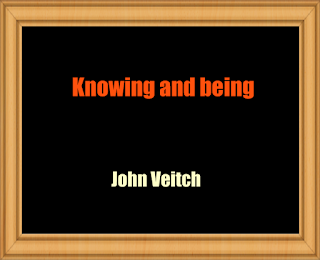Knowing and being
Excerpt:
The problem of Philosophy may be said to be twofold: on one side is the question, What do we know? on the other, What is? Obviously, the first question has its main interest for us as leading to the second. Our knowledge acquires interest and importance from what it teaches us regarding what is — regarding our own Self, the World, and God. Knowledge is a means, not an end. We do not know merely that we may contemplate or speculate. We know that we may believe. As knowledge issues in belief, it further issues in action, for we act as we believe. I put the question as to Knowing first; for it seems to me irrational to put that of Being first, or to attempt to settle any question about Being— about what is — first or apart from Knowing.
That is a vain method, as seems to me, though it is professed, always inconsistently acted upon. Further, I put the question as to knowing not only first, but in this form — What do we know? In these times it will be found pretty frequently put as. What can we know? I have no objection to this form of the question. I think we must in the end come to it.
We must consider the question as to the conditions, the reach, the limits of human knowledge. But I distinctly object to its being put first.
And I find very great disadvantages arising from its being so put. The risk of giving it the first place is, that we are apt to lay down conditions regarding perhaps one part or sphere of our knowledge only; and when we have got those partial conditions or limitations, we set them up as the laws of all knowledge, and come thus to exclude from knowledge many things that we do know. Hence I distinctly ob- get to what is called the Theory of Knowledge, if this be not preceded by a thorough examination and analysis of what we do as a matter of fact know in and by consciousness hi all its forms, — from Sense-Perception, through Memory, Imagination, Thinking— including concepts, judgments,
Download 5.8 MB, PDF book


